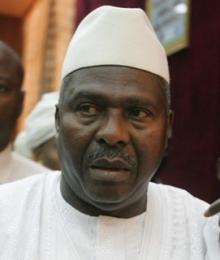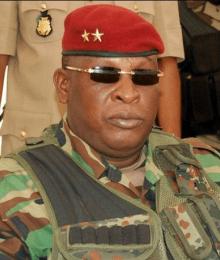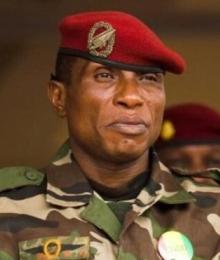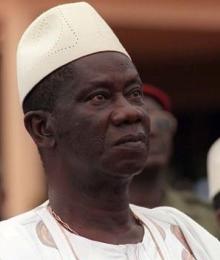
Elhadj Aboubacar Somparé (1944-2017) was a leading political figure in Guinea in the early 2000s. A brilliant student who became a teacher and then a senior civil servant, he climbed all levels of administration under the regimes of Sékou Touré and Lansana Conté.
He entered politics in the 1990s and served as President of the National Assembly from 2002 to 2008 and was the constitutional successor of Conté before being ousted by the military coup in 2008. A cultivated intellectual and a man of dialogue, this assembler was nevertheless prevented from accessing the highest office by force despite his long journey in the service of the Guinean State. He left the image of a great committed devoted to his country.
Introduction
Aboubacar Somparé was an important political figure in Guinea at the turn of the 2000s. Born on August 31, 1944 in Dakonta, Boké Prefecture, he climbed the administrative ladder before embracing a political career that led him to the head of the National Assembly from 2002 to 2008. A gathering personality but also a man of culture and knowledge, his journey was however broken by the military coup d'état of 2008 which prevented him from accessing the presidency of the Republic as provided for in the Constitution.
Education
From an early age, Aboubacar Somparé distinguished himself by his brilliant studies. First in his class from primary to university, he obtained a graduate degree in 1969 in mathematics-physics from Gamal Abdel Nasser University of Conakry. At the injunction of his uncle-teacher who had supported him, he gave up a postgraduate scholarship abroad in order to remain in the service of his country.
Professional career
Aboubacar Somparé began a rich career in administration and teaching in 1970, holding successively the positions of Regional Director of Education at Labé, Director General of Secondary Education, General Director of Information Services, Ambassador to France from 1978 to 1984, Adviser to the Ministry of Public Service, Administrator of the Palais des Nations, Rector of the University of Conakry from 1987 to 1989, and National Coordinator of the Programme of Adjustment of the Education Sector from 1989 to 1990. He thus faithfully served the regimes of Ahmed Sékou Touré and Lansana Conté.
Political career
Sensitive to the ideas of democracy and multi-partyism that emerged in Africa in the 1990s, Aboubacar Somparé created with other intellectuals the Party of Unity and Progress (PUP) supporting President Conté. In 1995, he was elected to Parliament and became Secretary-General of the PUP and Chairman of the parliamentary group PUP-PCN until 2002.
President of the National Assembly
At the end of the 2002 parliamentary elections, Lansana Conté appointed Aboubacar Somparé as president of the National Assembly despite reluctance within the PUP. During his tenure, Somparéined tense relations with the old President Conté, whose constitutional successor he was designated. There were rumors of his willingness to take power. Somparé, however, played a moderating role in calling for a postponement of the parliamentary elections to avoid unrest.
Interim President of the Republic of Guinea
On 23 December 2008, a few hours after the announcement of Lansana Conté's death, Aboubacar Somparé presented himself as interim President of the Republic in accordance with the Constitution. But in the morning, a group of soldiers took power by force and suspended the fundamental law.
2008 military coup
The coup d'état of the National Council for Democracy and Development (CNDD) led by Captain Moussa Dadis Camara ended Aboubacar Somparé's presidential ambitions. Trapped by the junta, he went into clandestinity for a few days before reappearing and calling on the international community to "prevent the military from interrupting the democratic process".
Political life after the coup
Removed from power, Aboubacar Somparé returned for a while in the shadows. The PUP, which he had helped to found, then experienced disagreements to divert him from the leadership of the party, before a reconciliation occurred in March 2009 with his former rival Sékou Konaté. In March 2010, Somparé was nominated as the PUP candidate for the June presidential election, but he was already weakened and lacked significant financial resources to conduct a real campaign.
Published work
Although Aboubacar Somparé left few writings published, he was nevertheless a cultivated intellectual and a lover of history, that of his native region of the Rio Nunez, of which he described the major stages in a book entitled Brief History of the Río Nunez: Republic of Guinea. (2008). He also owes several notable political speeches written for Presidents Sékou Touré and Lansana Conté.
Private life
From his marriage in 1972 to Astou Ka, a Senegalese of peole origin, Aboubacar Somparé had several children. Remaining very attached to his roots despite his high duties, he was a pillar gathering the large Somparé family and generously welcomed in Conakry many of Boké's parents who came to seek work or pursue studies. His wife Astou, an equally cultivated intellectual, shared her taste for knowledge. His son Amara Somparé, former Minister of Information and Communications, is a brilliant administrator and entrepreneur.
Death
Aboubacar Somparé died on 2 November 2017 at the age of 73, crushed by illness far from the top of the state he once believed to have reached. An impressive national funeral gathered the entire political class of Guinea to pay a final tribute to him.
Conclusion
As a teacher, senior official, accomplished politician and intellectual, Aboubacar Somparé embodied for more than 30 years the evolution of Guinea from independence to democratic transition. A moderate and gathering personality, however, his career was broken by the 2008 coup d'état which prevented him from fulfilling his last presidential ambitions. He nevertheless left the image of a great servant of the State, respected beyond partisan divisions for his integrity and dedication to the Guinean nation.

















